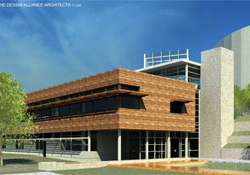
by Shane Henson — May 11, 2012—Pittsburgh’s Phipps Conservatory and Botanical Gardens has long been recognized as an eco-champion among America’s public gardens, but with the development of its 24,350-square-foot Center for Sustainable Landscapes (CSL), the facility has taken its commitment to sustainability and environmental stewardship to a new level with which few can currently compete.
Seeking to achieve or exceed the world’s highest sustainable standards, including the Living Building Challenge, the Leadership in Energy and Environmental Design (LEED) Platinum level, and the Sustainable Sites Initiative (SITES) certification for landscapes, the CSL is the largest operational structure pursuing living building status in the United States, and reportedly one of the greenest buildings on Earth. It will open to the public May 23, 2012.
Constructed with local talent and mostly U.S.-made materials, the CSL—home base for environmental education and research—aims to achieve net-zero energy consumption with solar photovoltaics, geothermal wells and a vertical axis wind turbine, as well as passive cooling, heating and lighting methods. It will also save resources by treating and reusing all water captured on site, says Phipps.

Additionally, the CSL will interact with its environs as a vital part of daily operation, blurring the lines between the natural and built environments. And, as a global SITES pilot project, it will feature a restorative landscape with native plants and a demonstration green roof garden. Other site features include a lagoon, water distillation system, rain gardens, and constructed wetlands.
“Designed and built by Pittsburghers and Pennsylvanians as an innovation for the world, the CSL will serve as a model for how we can all work together with nature to make our communities healthier, safer and more supportive of life,” says Phipps’ Executive Director Richard V. Piacentini. “It will also give visitors the opportunity to see just how beautiful and practical green can be.”
A leader in green building and operations, Phipps has also constructed the first LEED visitor center in a public garden—complete with a 3-star Green Restaurant Certified café and what was described as the world’s most energy-efficient tropical forest conservatory when it opened in 2006.




